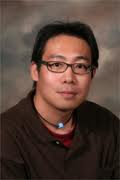Plenary Speakers
There will be three general sessions, including four speakers:
 Sam Kaplan, UNC Asheville, 2012 Section Teaching Award Recipient
Sam Kaplan, UNC Asheville, 2012 Section Teaching Award Recipient
Math Ambassador
As professional math educators we are math ambassadors whether or not we choose this mantle. Interaction with students, faculty, administrators, neighbors, family and even store clerks becomes an opportunity to talk about. We will cover some of the pros and cons of this type of behavior, how to choose your battles and what people mean when they say they don't like math. We will also distinguish between in-reach, outreach and peer reach.
 Hua Wang, Georgia Southern University, 2012 Section Teaching Award for Beginning
Faculty Recipient
Hua Wang, Georgia Southern University, 2012 Section Teaching Award for Beginning
Faculty Recipient
Colonel Blotto's Winning Ways
Colonel Blotto's game, originally a game theory topic, seeks strategies in a two-player game to allocate soldiers across battlefields. Through a modified version of the game, basic Enumerative Combinatorics is connected to a resource allocation problem. This talk contains joint work with Georgia Southern students Alex Collins, Charles Dedrickson, and Toby Sanders.
 Hugh Howards, Wake Forest University, 2012-2013 Section Lecturer
Hugh Howards, Wake Forest University, 2012-2013 Section Lecturer
Forming the Borromean Rings from Random Curves
The Borromean Rings in their most common representation appear to be made out of round circles, but a result of Mike Freedman and Richard Skora shows that this is impossible. Although they cannot be built out of round circles, the link can be built out of planar convex curves. For example, one can form them from two circles and an ellipse.
We address numerous results and open questions about the Borromean rings including a surprising conjecture that circles are, in fact, the only unknotted curves that cannot be used to form them. We give a partial answer to the validity of that conjecture and then point out that whether the answer is yes or no may well depend on how you interpret its phrasing.
No background in knot theory or topology is necessary and the talk is designed to be accessible to undergraduates with a general interest in mathematics.
 Rick Gillman, Valparaiso University and MAA Chair of the Committee on Sections
Rick Gillman, Valparaiso University and MAA Chair of the Committee on Sections
Why do Left-handed People Survive?
This talk explores the question of why people are predominately right-handed, a trait shared by no other species. It answers the title question by considering the cultural, biological, and genetic explanations for our left-handedness. In particular, an evolutionary game theoretic model is offered to explain why it may be advantageous (from and evolutionary perspective) to have a fraction of the population be left-handed.
General sessions will be held in the DiGiorgio Campus Center.